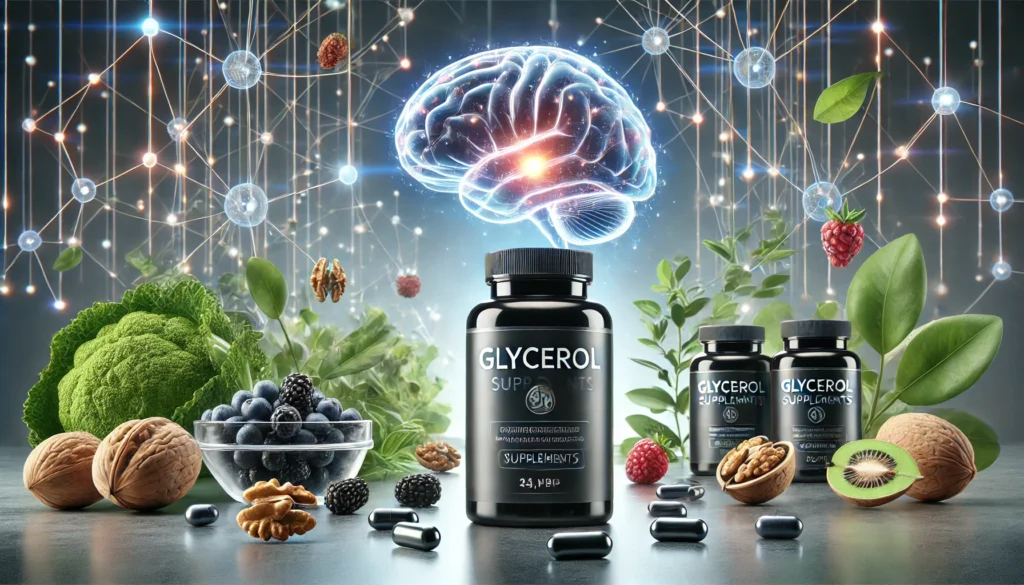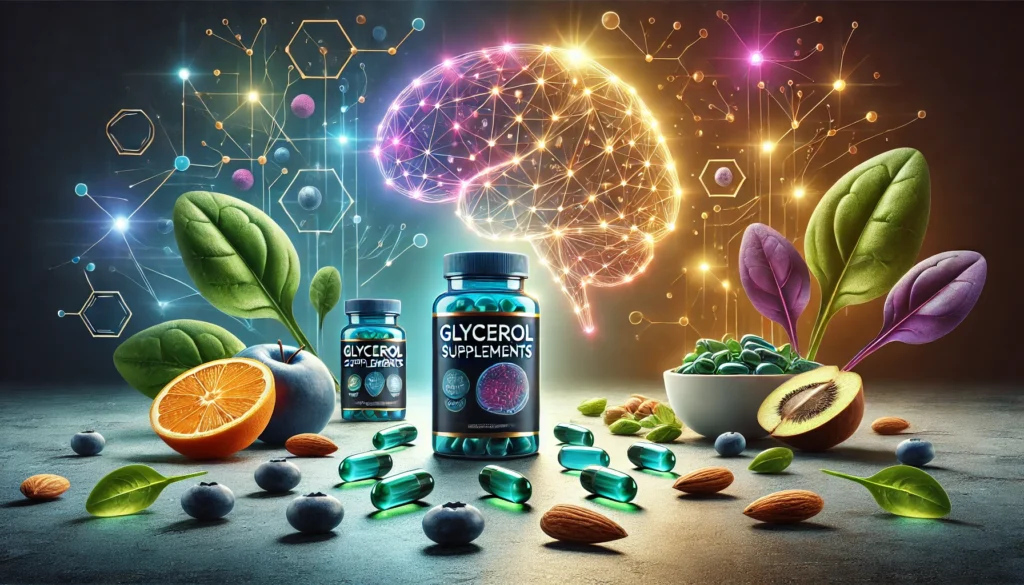Glycerol, a simple polyol compound, is a colorless, odorless, and sweet-tasting viscous liquid that plays an integral role in numerous biological processes. As a fundamental component of triglycerides and phospholipids, glycerol is involved in energy metabolism, cellular signaling, and maintaining cellular structure. Its increasingly recognized potential as a nootropic supplement has spurred interest in its cognitive benefits and mechanisms of action in the brain. This article explores the sources, chemistry, physiological mechanisms, potential nootropic benefits, dosing guidelines, side effects, drug interactions, and essential safety considerations associated with glycerol supplementation.
You May Also Like:
Sources of Glycerol
Glycerol is naturally produced in the body through the metabolism of carbohydrates and fats, serving as a backbone for the synthesis of triglycerides. While the body synthesizes sufficient amounts of glycerol under normal conditions, it can also be obtained from dietary sources, including:
- Animal Products: Glycerol can be found in fats and oils from animal sources, such as butter, lard, and fatty cuts of meat.
- Plant-Based Oils: Vegetable oils, such as olive oil and coconut oil, contain glycerol in their triglyceride form.
- Processed Foods: Glycerol is often used as a sweetener or humectant in processed foods and beverages, as well as in cosmetics and pharmaceuticals.
In addition to these dietary sources, glycerol is available as a dietary supplement, often in the form of glycerol monostearate or glycerol powder.

Chemistry of Glycerol
Glycerol (C₃H₈O₃) is a three-carbon alcohol with hydroxyl (–OH) functional groups attached to each carbon atom. This molecular structure allows glycerol to interact readily with water, making it a highly soluble compound. Glycerol can undergo various biochemical reactions, including phosphorylation, to form glycerol-3-phosphate, which is critical in lipid metabolism and energy production.
As a polyol, glycerol also acts as an osmolyte, helping to regulate osmotic pressure in cells. Its hydrophilic properties contribute to maintaining cellular hydration and volume, which can be particularly relevant for brain health.
Physiological Mechanisms of Glycerol in the Body and Brain
The potential nootropic effects of glycerol arise from several physiological mechanisms:
- Energy Metabolism: Glycerol serves as a substrate for gluconeogenesis, allowing the liver to convert it into glucose when energy is needed. This process is particularly vital during periods of fasting or intense physical activity, providing an additional energy source for brain cells that have high metabolic demands.
- Hydration and Osmoregulation: Glycerol’s osmotic properties help maintain cellular hydration. In the brain, proper hydration is essential for optimal neuronal function and signaling. Dehydration can impair cognitive performance, and glycerol supplementation may support brain hydration, enhancing overall cognitive function.
- Neuroprotection: Glycerol has been shown to exert neuroprotective effects by reducing oxidative stress and inflammation. Its ability to scavenge free radicals and promote cellular repair mechanisms may protect against neurodegenerative diseases and cognitive decline associated with aging.
- Enhancement of Cognitive Function: Emerging research suggests that glycerol may positively influence cognitive function, particularly in areas such as memory and learning. Its role in energy metabolism, hydration, and neuroprotection contributes to an overall enhancement of cognitive performance.

Nootropic Benefits of Glycerol
Glycerol has garnered attention for its potential nootropic benefits, particularly in the realm of cognitive enhancement and overall brain health. Here are some key advantages associated with glycerol supplementation:
- Cognitive Enhancement: Glycerol may significantly improve cognitive function, especially during demanding tasks that require prolonged mental effort. By serving as an additional energy source and aiding in hydration, glycerol can enhance focus, memory retention, and learning capabilities. This is particularly beneficial for students, professionals, or anyone needing to perform at their best under pressure.
- Increased Physical Performance: Athletes often turn to glycerol to boost their performance and endurance. Its unique properties promote fluid retention and cellular hydration, leading to enhanced exercise capacity. This increase in physical performance can have a positive ripple effect on cognitive function during workouts, as physical activity is closely linked to improved brain health. When the body is well-hydrated, mental clarity and cognitive sharpness are more easily maintained.
- Mood Regulation: Preliminary studies suggest that glycerol may positively influence mood and emotional well-being. By supporting energy metabolism and helping to reduce oxidative stress, glycerol could contribute to a better overall mood. An improved mood can directly impact cognitive function, making it easier to concentrate and engage in learning or complex tasks. This connection highlights the importance of mental health in achieving cognitive success.
- Neuroprotective Effects: Glycerol may also exhibit neuroprotective properties, potentially slowing cognitive decline and offering a safeguard against neurodegenerative diseases. Its ability to reduce oxidative stress and inflammation suggests that glycerol could play a role in protecting brain cells from damage. This quality makes it an intriguing candidate for further research in the context of long-term brain health and cognitive longevity.
- Enhanced Hydration and Recovery: Glycerol can facilitate improved hydration levels during exercise, which is essential for optimal physical and cognitive performance. Its ability to retain water in the body can help prevent dehydration, especially during strenuous activities. This increased hydration can contribute to faster recovery post-exercise, allowing individuals to maintain higher levels of cognitive function as they recover.
- Improved Sleep Quality: There is emerging evidence that glycerol may play a role in improving sleep quality. Adequate sleep is crucial for cognitive function, as it aids in memory consolidation and mental rejuvenation. By potentially enhancing sleep quality, glycerol may support better cognitive performance during waking hours.
- Support for Metabolic Health: Glycerol’s potential to support metabolic health may also indirectly benefit cognitive function. Healthy metabolism is linked to improved energy levels and brain function. By promoting better metabolic processes, glycerol can help ensure that the brain receives the energy it needs to operate efficiently, potentially enhancing overall cognitive performance.

Dosage and Supplementation Guidelines
While glycerol can be obtained through dietary sources, supplementation may be beneficial for those seeking enhanced cognitive and physical performance. The appropriate dosage of glycerol depends on individual needs, activity levels, and health status.
- General Supplementation: A common dosage range for glycerol supplementation is between 1 to 10 grams per day, depending on individual goals and tolerability. Most users start at the lower end of this range and gradually increase their intake to assess their response.
- Athletic Performance: For athletes, glycerol is often used in pre-exercise supplementation to enhance hydration and endurance. Typical dosages range from 1 to 1.5 grams per kilogram of body weight, taken approximately 30-60 minutes before exercise. However, athletes should monitor their individual response to glycerol to optimize dosing.
- Forms of Supplementation: Glycerol supplements are available in various forms, including powders, capsules, and liquid solutions. Glycerol powder is popular among athletes for easy mixing with fluids, while capsules offer convenience for daily use.
It is essential to note that glycerol is well-tolerated by most individuals, but higher doses may lead to gastrointestinal discomfort. Users should consider their individual tolerance levels and adjust their intake accordingly.
Side Effects and Safety
Glycerol is generally regarded as safe when consumed in moderate amounts. However, some individuals may experience mild side effects, particularly at higher dosages. Common side effects include:
- Gastrointestinal Distress: Some users may experience diarrhea, nausea, or abdominal discomfort when taking glycerol, especially at higher doses.
- Headaches: A small percentage of individuals report headaches associated with glycerol supplementation, which may be due to changes in osmotic balance.
- Allergic Reactions: Though rare, allergic reactions to glycerol supplements can occur, manifesting as rash, itching, or swelling. Individuals with known sensitivities should consult a healthcare provider before use.

Interactions with Other Supplements and Medications
Glycerol may interact with other supplements and medications, warranting caution for individuals considering its use. Some notable interactions include:
- Diuretics: Glycerol’s osmotic properties may counteract the effects of diuretics, which are designed to promote fluid loss. Individuals taking diuretics should consult their healthcare provider before adding glycerol to their regimen.
- Blood Sugar Medications: Glycerol may influence blood sugar levels, potentially affecting those on diabetes medications. Monitoring blood sugar levels is advised when introducing glycerol supplementation.
- Caffeine: Combining glycerol with caffeine may enhance cognitive function and physical performance. However, individuals should monitor their response to this combination, as excessive caffeine intake can lead to jitteriness and anxiety.
- Other Nootropics: Glycerol can be safely combined with other nootropic supplements, such as racetams or cholinergic compounds, to enhance cognitive function. However, users should remain cautious about overall dosing to avoid overstimulation.
Risks for Individuals with Certain Health Conditions
While glycerol is generally safe for most individuals, specific health conditions may require caution when using this supplement:
- Kidney Disease: Individuals with compromised kidney function should be cautious with glycerol supplementation, as impaired kidneys may struggle to excrete excess amounts. Consulting a healthcare provider is recommended.
- Diabetes: Those with diabetes should monitor their blood sugar levels closely when using glycerol, as it can affect glucose metabolism. It is advisable to discuss glycerol use with a healthcare professional.
- Pregnancy and Breastfeeding: There is limited research on glycerol supplementation during pregnancy and breastfeeding. Pregnant or nursing individuals should consult their healthcare provider before using glycerol supplements.
Should You Consider Glycerol as a Nootropic?
Glycerol’s multifaceted role in energy metabolism, hydration, neuroprotection, and potential cognitive enhancement makes it a compelling candidate for individuals seeking nootropic benefits. As a supplement, glycerol may support improved cognitive performance, mood regulation, and physical endurance, contributing to overall brain health. However, while the current research on glycerol as a nootropic is promising, further studies are necessary to confirm its efficacy and safety.
Before beginning glycerol supplementation, individuals should consult with a healthcare professional, especially if they have pre-existing health conditions or are taking medications that may interact with glycerol. By understanding the benefits and potential risks associated with glycerol, individuals can make informed decisions about its use as a nootropic supplement. Overall, maintaining adequate glycerol levels through diet or supplementation can optimize brain function, enhance cognitive performance, and promote overall mental well-being.

References:
- Glycerol for acute stroke. Retrieved from: https://pmc.ncbi.nlm.nih.gov/articles/PMC7038654/
- Glycerol – Uses, Side Effects, and More. Retrieved from: https://www.webmd.com/vitamins/ai/ingredientmono-4/glycerol
- Glycerol Improves Intracerebral Hemorrhagic Brain Injury and Associated Kidney Dysfunction in Rats. Retrieved from: https://pmc.ncbi.nlm.nih.gov/articles/PMC8073011/
Important Note: The information contained in this article is for general informational purposes only, and should not be construed as health or medical advice, nor is it intended to diagnose, prevent, treat, or cure any disease or health condition. Before embarking on any diet, fitness regimen, or program of nutritional supplementation, it is advisable to consult your healthcare professional in order to determine its safety and probable efficacy in terms of your individual state of health.
Regarding Nutritional Supplements Or Other Non-Prescription Health Products: If any nutritional supplements or other non-prescription health products are mentioned in the foregoing article, any claims or statements made about them have not been evaluated by the U.S. Food and Drug Administration, and such nutritional supplements or other health products are not intended to diagnose, treat, cure, or prevent any disease.


